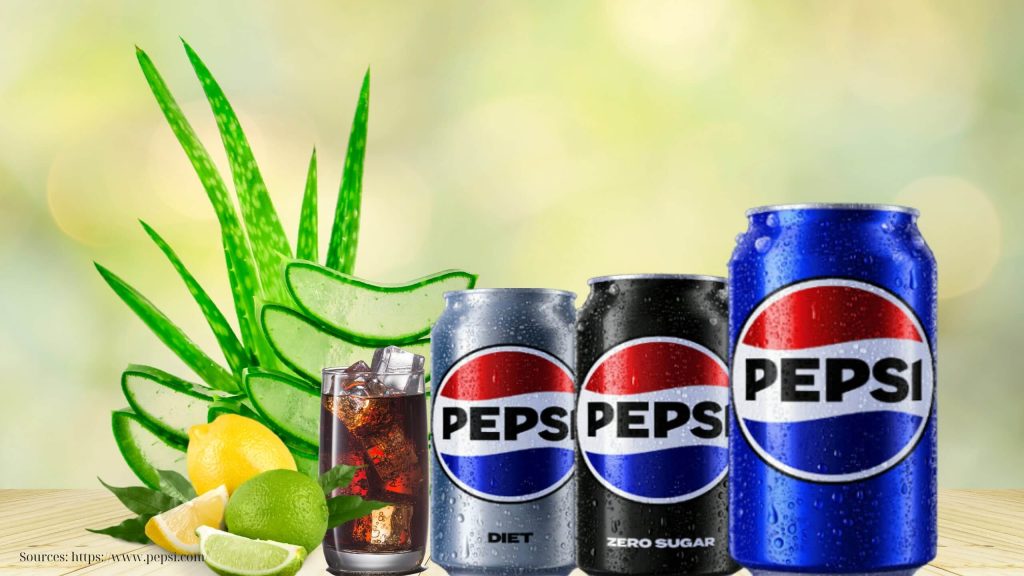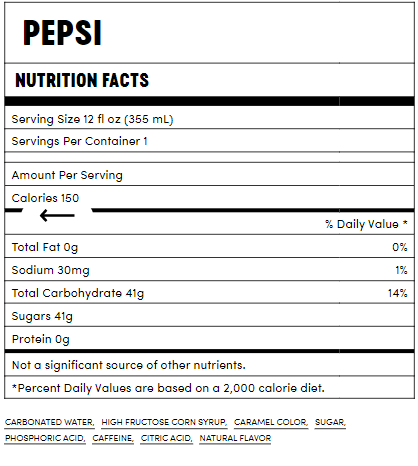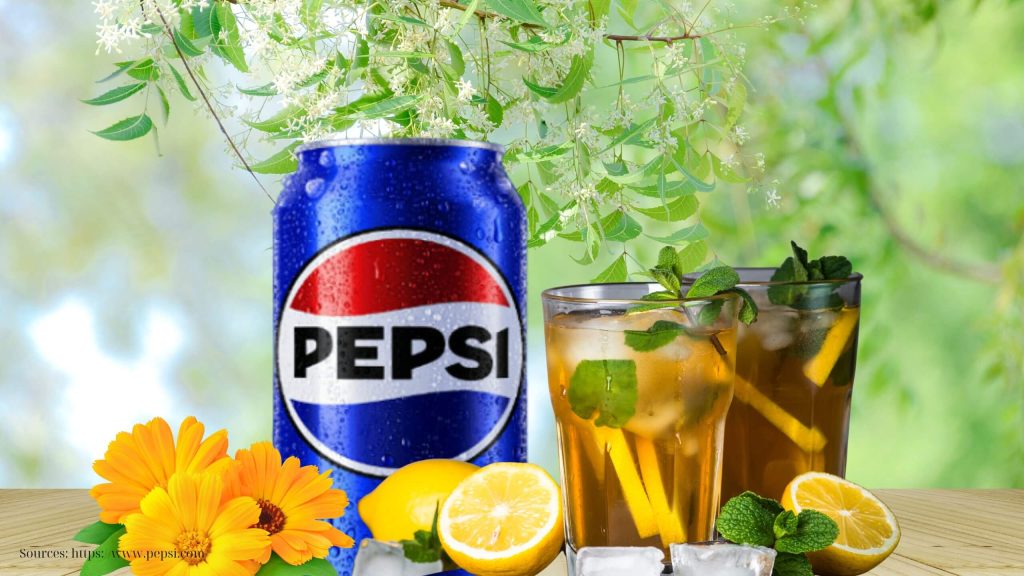Contents
- 1 How Much Caffeine Is In A Pepsi?
- 1.1 What Exactly Is Pepsi?
- 1.2 History of Pepsi:
- 1.3 How does Pepsi Taste?
- 1.4 Different Flavors of Pepsi Available:
- 1.5 Ingredients of Pepsi:
- 1.6 Nutrition Facts of Pepsi:
- 1.7 Does Pepsi Have Caffeine?
- 1.8 How Much Caffeine Is In A Pepsi?
- 1.9 Caffeine in Pepsi Variants:
- 1.10 Comparison of Caffeine In Pepsi With other Soda Drinks:
- 1.11 Different Caffeine in Pepsi and Coffee:
- 1.12 Health Benefits Of Caffeine In Pepsi:
- 1.13 Caffeine Alternatives to Pepsi:
- 1.14 Tips For Reducing Your Caffeine Intake:
- 1.15 FAQs: How Much Caffeine Is In A Pepsi?
- 1.15.1 Q: Is Pepsi healthy?
- 1.15.2 Q: Are there any alternatives to caffeine for boosting energy?
- 1.15.3 Q: What are the side effects of drinking too much Pepsi?
- 1.15.4 Q: Does Pepsi contain sugar?
- 1.15.5 Q: Is Pepsi safe to drink every day?
- 1.15.6 Q: Is Pepsi Caffeine-Free?
- 1.15.7 Q: What is the difference between Diet Pepsi and regular Pepsi?
- 1.15.8 Q: How much caffeine is in a 20 oz Pepsi?
- 1.15.9 Q: How much caffeine is in a diet of Pepsi?
- 1.15.10 Q: What is the best time of day to drink Pepsi?
- 1.15.11 Q: What is the difference between Pepsi and Coke?
- 1.15.12 Q: Is Pepsi good for weight loss?
- 1.15.13 Q: Does Pepsi have any nutritional value?
- 1.15.14 Q: Is Pepsi better than coffee?
- 1.15.15 Q: Is drinking Pepsi bad for you?
- 1.15.16 Q: Does drinking Pepsi dehydrate you?
- 1.15.17 Q: Is there caffeine-free Pepsi?
- 1.15.18 Q: How much caffeine is in a 16.9 oz Pepsi?
- 1.15.19 Q: How much caffeine is in a 16oz Pepsi?
- 1.15.20 Q: Is there a sugar-free version of Pepsi?
- 1.15.21 Q: How much caffeine is in Pepsi vs. Dr Pepper?
- 1.15.22 Q: Does Pepsi have as much caffeine as coffee?
- 1.15.23 Q: Can Pepsi keep you awake?
- 1.16 Conclusion: How Much Caffeine Is In A Pepsi?
- 1.17 Related posts:
- 2 Top 15 Keto Snacks for Christmas You'll Absolutely Love
- 3 How Long Does Espresso Last? Expert Storage Tips
- 4 How to Make Coffee Yogurt: A Comprehensive Guide
- 5 How Much Caffeine in Coffee? Your Ultimate Guide
How Much Caffeine Is In A Pepsi?
Are you a Pepsi lover who also needs your daily caffeine fix? If so, it’s important to understand: how much caffeine is in a Pepsi. Too much caffeine can increase blood pressure and cause insomnia, so understanding the content of each bottle is key to safely enjoying this sweet soft drink.
In this blog post, we’ll explore exactly how much caffeine is in a typical serving of Pepsi and discuss ways it might affect your health. Get ready for an interesting dive into the world of nutrition!
What Exactly Is Pepsi?

Pepsi is a soft drink brand created in 1898 by Caleb Bradham in New Bern, North Carolina. Since its inception, it has become one of the world’s most recognizable and popular soda brands. It’s available in regular, diet, and caffeine-free variations, offering slightly different nutritional profiles.
History of Pepsi:
Pepsi has been a leading brand in the beverage industry for over a century. The history of Pepsi dates back to the late 1893s when Caleb Bradham, a pharmacist in North Carolina, created it. Who was looking for a refreshing beverage to serve in his drugstore?
Originally named “Brad’s Drink,” Caleb’s innovative beverage was a hit among his customers, who praised its refreshing taste and unique flavor. The name was later changed to Pepsi-Cola in 1898, and the brand expanded nationwide and worldwide.
Over the years, the recipe has evolved, and this delicious and thirst-quenching beverage continues to delight consumers of all ages. With a rich history of innovation and excellence, it’s no wonder why Pepsi is still beloved by people around the globe today.
How does Pepsi Taste?
Pepsi has a distinct flavor that stands out among other soft drinks. It’s slightly sweeter than its competitor, Coca-Cola, and contains notes of lemon and lime. This unique taste has remained essentially unchanged since the brand’s inception in 1898.
Many Pepsi enthusiasts praise its smooth, crisp taste and claim that there’s nothing like the cool, refreshing taste of a cold Pepsi on a hot day. Others prefer it as a perfect accompaniment to their favorite meal or snack. No matter the occasion, Pepsi’s taste has captured the hearts of many and will continue to do so for years to come.
Different Flavors of Pepsi Available:
In addition to its classic flavor, Pepsi also offers a variety of other flavors to meet different needs and preferences. You’ll usually find a variety of 2 to 3 different Pepsi flavors in most corner stores or supermarkets.
Are you curious to know the total number of flavors Pepsi offers? I delved into the official Pepsi websites, and here’s what I uncovered.
There are a delightful variety of 20 Pepsi flavors to choose from. These flavors go beyond the classic Pepsi taste, including refreshing fruit flavors sugar-free and caffeine-free options.
In the United States alone, you can find approximately 15 flavors:
- Regular Pepsi
- Pepsi Mango
- Pepsi Vanilla
- Pepsi Zero Sugar
- Pepsi Zero Sugar Mango
- Pepsi Zero Sugar Wild Cherry
- Pepsi Zero Sugar Vanilla
- Diet Pepsi
- Diet Wild Cherry Pepsi
- Diet Pepsi Caffeine Free
- Nitro Pepsi
- Nitro Pepsi – Vanilla
- Pepsi Wild Cherry
- Pepsi Caffeine Free
- Pepsi With Real Sugar
Internationally, you’ll be thrilled to discover many unique and enticing flavors.
Several limited-edition flavors, such as Pepsi Vanilla, Pepsi Natural, Crystal Pepsi, Pepsi Ginger, and Pepsi Blue, have been released.
These unique variations bring something special to the table and offer an enjoyable experience for each type of consumer.
Ingredients of Pepsi:
The ingredients of Pepsi include high fructose corn syrup, caramel color, phosphoric acid, caffeine, citric acid, natural flavors, and carbonated water. Pepsi’s unique blend of these ingredients creates the crisp and refreshing taste we love.
Committed to transparency, PepsiCo ensures that all ingredients are safe, regulated by the FDA, and comply with all relevant food regulations. Pepsi’s commitment to quality is exemplified in every sip, making it a perfect choice for all occasions.
Nutrition Facts of Pepsi:
The nutrition facts of Pepsi differ slightly depending on the type of formula you choose. The original Pepsi contains 150 calories per 12-ounce serving, 41 grams of carbohydrates, and 30 milligrams of sodium. It also includes 38 milligrams of caffeine, which is relatively standard for a caffeinated soda.
On the other hand, Diet Pepsi contains zero calories and 35 milligrams of sodium per 12-ounce serving, with no carbohydrates or sugars. Additionally, it has only 35 milligrams of caffeine, significantly less than its regular counterpart.
Here is the nutrition facts of Pepsi:

Does Pepsi Have Caffeine?
Pepsi is a popular beverage around the world. While it tastes great and offers a refreshing break, many wonder whether it contains caffeine. The answer is yes, Pepsi does contain caffeine. Its caffeine content is less than coffee or tea but still present.
A 12-ounce can of Pepsi contains about 38 milligrams of caffeine, similar to the amount current in a standard 8-ounce cup of green or black tea. While Pepsi can give you a quick energy boost, it is important to be aware of the amount of caffeine you’re consuming to avoid overdoing it and suffering from adverse side effects such as jitteriness or headaches.
How Much Caffeine Is In A Pepsi?

The amount of caffeine in a Pepsi depends on the type you choose; however, most versions contain 38 milligrams per 12-ounce serving. This amount is considered moderate and is lower than some other caffeinated beverages, such as energy drinks.
For those sensitive to caffeine, it’s important to note that several Pepsi variations are low in caffeine or even caffeine-free. Diet Pepsi contains only 35 milligrams of caffeine in a 12-ounce serving, and caffeine-free Pepsi contains zero milligrams.
It’s important to monitor caffeine intake and be aware of its potential effects on the body. While caffeine can boost energy and improve alertness, excessive consumption can lead to negative symptoms such as anxiety and insomnia. Ultimately, it’s up to the individual to determine their caffeine tolerance and make informed decisions about their consumption.
Caffeine in Pepsi Variants:
Pepsi comes in several different types to meet various consumer needs and preferences. Here is the caffeine content in Pepsi Variants

The caffeine content of each type will vary slightly depending on the region where it was manufactured. It’s important to always check the label for accurate information before consuming a product.
Pepsi is a popular beverage enjoyed by many around the world. Its unique blend of ingredients creates an unmistakable taste and provides consumers with several varieties.
Whether you’re looking for a classic flavor or something more exotic, there’s sure to be a Pepsi flavor that will tantalize your taste buds and satisfy your craving.
Comparison of Caffeine In Pepsi With other Soda Drinks:
Pepsi contains 38 milligrams of caffeine per 12-ounce serving. Therefore, Pepsi provides a mild energizing effect that won’t give you the jitters.
Here are the caffeine content in other Soda Drinks:

Overall, it’s essential to be aware of the amount of caffeine and sugar content when consuming any type of soda. It’s best to limit your intake and choose healthier options when possible.
Different Caffeine in Pepsi and Coffee:
Pepsi and coffee both contain caffeine, but there are significant differences in the caffeine content of each beverage. A 12-ounce can of Pepsi contains 38 milligrams of caffeine, while a cup of brewed coffee will provide 136 milligrams per 12-ounce serving. Therefore, a cup of coffee offers considerably more caffeine than Pepsi.
The caffeine content of Pepsi is approximately one-third the amount found in coffee, making it a milder option for those who don’t want too much stimulation.
The decision between Pepsi and Coffee comes down to personal preference. Both beverages offer a refreshing energy boost, so it’s simply a matter of choosing the one that tastes best.
Health Benefits Of Caffeine In Pepsi:
Most people think of coffee or energy drinks when it comes to caffeine, but Pepsi can also boost energy and alertness. A moderate amount of caffeine from sources like Pepsi can have several positive health benefits, such as improved concentration and focus, increased metabolism, and reduced fatigue.
Caffeine is also known to increase physical performance and energy expenditure during exercise. Studies have shown that consuming low to moderate amounts of caffeine before a workout can help you perform better by increasing alertness, reducing perceived effort levels, and improving endurance.
Pepsi contains magnesium and potassium, important in maintaining healthy energy levels, aiding muscle function, and promoting a healthy cardiovascular system.
It’s important to remember that caffeine can be beneficial in moderation. While consuming too much caffeine can lead to negative side effects like jitteriness or headaches, the moderate amounts present in Pepsi can boost energy and alertness when you need it most.
Caffeine Alternatives to Pepsi:
If you’re looking for an alternative way to get your caffeine fix without soda, several other options can be just as satisfying. Tea is a great choice, containing many powerful antioxidants and natural caffeine content.
Green tea has around 25 milligrams of caffeine per cup, while black tea contains approximately 50 milligrams.
Coffee is another popular choice and can be brewed at home or purchased from a coffee shop. It usually contains around 95 milligrams of caffeine per 8-ounce serving.
Tips For Reducing Your Caffeine Intake:

Set a Caffeine Limit
The first step to reducing your caffeine intake is to set a limit for yourself. Depending on your current consumption, start by cutting down gradually or setting an absolute cap on the amount of caffeine you consume each day. This will help you stay within your desired range and make it easier to stick to your goal.
Choose Lower-Caffeine Alternatives
If you’re used to drinking coffee every day, try switching to tea or decaf instead. Both contain lower amounts of caffeine than regular coffee, so they can help you reduce your intake without sacrificing flavor. You can also try adding milk or cream to your beverages, as this will dilute the caffeine content and make it easier to track your consumption.
Avoid Caffeine Late in the Day:
It’s best to avoid consuming caffeine late in the day, as this can interfere with your sleep cycle and cause insomnia or other sleep disturbances. Try switching out coffee for tea in the afternoon and evening, or opt for decaf if you need a pick-me-up later in the day.
Have Healthy Snacks On Hand
Having healthy snacks available throughout the day can help reduce cravings for caffeinated beverages and provide an alternative energy source when needed. Some good options include nuts, seeds, fresh fruit, yogurt, granola bars, and trail mix. These snacks are packed with nutrients that can help give you sustained energy throughout the day without relying on caffeine for a quick fix.
Stay Hydrated
Staying hydrated is essential for maintaining energy levels throughout the day and avoiding fatigue that could lead to excessive caffeine consumption. Make sure that you’re drinking plenty of water throughout the day as well as other fluids such as herbal teas or low-sugar juices if desired.
You may like to read:
FAQs: How Much Caffeine Is In A Pepsi?
Q: Is Pepsi healthy?
Pepsi is not considered a healthy drink, as it contains high levels of sugar and caffeine. It also has no nutritional value. However, moderate consumption of Pepsi in moderation can boost energy and alertness without the jitters that come with consuming too much caffeine.
Q: Are there any alternatives to caffeine for boosting energy?
There are several natural ways to boost energy levels without relying on caffeine, such as exercising regularly, sleeping well at night, eating nutritious foods throughout the day, and having healthy snacks available when you need an extra energy boost. Drinking plenty of water is also crucial for avoiding fatigue that could lead to excessive caffeine consumption.
Q: What are the side effects of drinking too much Pepsi?
Drinking too much Pepsi can have several negative side effects, such as jitteriness, headaches, insomnia, and dehydration due to its high sugar and caffeine content. It can also lead to weight gain if consumed in large amounts, so it’s important to consume soda in moderation.
Q: Does Pepsi contain sugar?
Yes, Pepsi contains sugar. A 12-ounce can of Pepsi contains 41 grams of sugar, which is roughly equal to 10 teaspoons. Excessive sugar intake can result in weight gain and various health complications. Therefore, it is crucial to consume Pepsi in moderation to maintain overall well-being.
Q: Is Pepsi safe to drink every day?
Drinking Pepsi every day is not recommended due to its high sugar and caffeine content. It is best to consume soda in moderation when looking for an energy or alertness boost.
Q: Is Pepsi Caffeine-Free?
No, Pepsi is not caffeine-free. A 12-ounce can of Pepsi contains about 38 milligrams of caffeine.
Q: What is the difference between Diet Pepsi and regular Pepsi?
The main difference between Diet Pepsi and regular Pepsi is the calories. Regular Pepsi contains about 150 calories per 12-ounce can, while Diet Pepsi contains 0 calories. Diet Pepsi also has slightly less caffeine than regular Pepsi. Both types of soda include high amounts of sugar.
Q: How much caffeine is in a 20 oz Pepsi?
A 20-ounce bottle of Pepsi contains about 63 milligrams of caffeine.
Q: How much caffeine is in a diet of Pepsi?
A 12-ounce can of Diet Pepsi contains about 35 milligrams of caffeine, slightly lower than the amount found in regular coffee.
Q: What is the best time of day to drink Pepsi?
The best time to drink Pepsi is during the morning and early afternoon, as this will provide an extra energy boost without interfering with your sleep cycle.
Q: What is the difference between Pepsi and Coke?
The main difference between Pepsi and Coke is their taste – Pepsi has a sweeter and slightly spicier flavor than Coke. In terms of ingredients, they are both made from carbonated water, sugar or high fructose corn syrup, caffeine, phosphoric acid, citrus oils, and caramel color. Both types of soda contain high amounts of sugar, so it’s important to consume them in moderation when looking for an energy or alertness boost.
Q: Is Pepsi good for weight loss?
No, Pepsi is not considered a good option for weight loss due to its high sugar and caffeine content. It is best to stick with healthy snacks and beverages when trying to lose weight. If you decide to consume Pepsi, it’s important to keep your consumption in moderation due to the potential for negative health effects if consumed in large amounts.
Q: Does Pepsi have any nutritional value?
No, Pepsi does not have any nutritional value. It is primarily made of carbonated water, sugar or high fructose corn syrup, caffeine, phosphoric acid, citrus oils, and caramel color. Consuming too much Pepsi can lead to weight gain due to its high sugar content.
Q: Is Pepsi better than coffee?
It depends on your individual preferences and needs. Coffee contains more caffeine than Pepsi, which may provide a stronger energy boost in certain situations. However, if you are sensitive to caffeine or don’t like the taste of coffee, opting for Pepsi could be a good option.
Q: Is drinking Pepsi bad for you?
Drinking Pepsi in moderation is generally considered safe. However, it’s important to remember that the high sugar and caffeine content can lead to negative side effects if consumed in large amounts. Sticking a moderate quantity of Pepsi is best to satisfy your energy needs.
Q: Does drinking Pepsi dehydrate you?
Yes, drinking Pepsi can lead to dehydration due to its high sugar content. Consuming too much sugar forces your body to use more water to process it, resulting in a net loss of fluids. It’s important to remember to consume soda in moderation and stay hydrated while doing so.
Q: Is there caffeine-free Pepsi?
Yes, A 12-ounce can of caffeine-free Pepsi contains about 0 milligrams of caffeine.
Q: How much caffeine is in a 16.9 oz Pepsi?
A 16.9-ounce bottle of Pepsi contains about 53 milligrams of caffeine. It’s important to remember to consume soda in moderation when trying to satisfy your energy needs.
Q: How much caffeine is in a 16oz Pepsi?
A 16-ounce bottle of Pepsi contains about 50 milligrams of caffeine.
Q: Is there a sugar-free version of Pepsi?
Yes, there is a sugar-free version of Pepsi called Diet Pepsi. If you are looking for an even healthier option, opting for tea or water is best.
Q: How much caffeine is in Pepsi vs. Dr Pepper?
A 12-ounce can of Pepsi contains about 38 milligrams of caffeine, slightly lower than the amount found in regular coffee. A 12-ounce can of Dr Pepper contains about 42 milligrams of caffeine, slightly higher than the amount found in a Pepsi-can.
Q: Does Pepsi have as much caffeine as coffee?
No, Pepsi does not have as much caffeine as coffee. A 12-ounce Pepsi contains about 35 milligrams of caffeine, slightly lower than the amount found in regular coffee with 136 mg per 12 fl. oz.
Q: Can Pepsi keep you awake?
Yes, Pepsi can help keep you awake due to its caffeine content. So, it’s important to remember to consume soda in moderation to satisfy your energy needs.
Conclusion: How Much Caffeine Is In A Pepsi?
It’s important to be aware of the amount of caffeine in a can of Pepsi. It may look like your favorite, harmless soft drink, but it could have more caffeine than you expect. Research suggests that safe levels of caffeine intake vary depending on age and individual tolerance. So, if you decide to indulge in a reprieve from everyday life with a can of Pepsi, keep these numbers in mind when choosing what’s suitable for you.
Moreover, it is important to remember that if you consume caffeinated beverages as part of your daily routine, monitoring your consumption is necessary for tested safety, according to the Food and Drug Administration. If you appreciate this blog post on how much caffeine is in a Pepsi can, don’t hesitate to share it with your friends and family!
Sources: https://www.pepsi.com/#!products
Related posts:

Hello, my name is Mary. I’m a passionate food and drink enthusiast, sharing flavorful recipes, creative drinks, and culinary inspiration from around the world. With a love for exploring new tastes and traditions, I bring a mix of easy-to-follow guides and expert tips to make every meal an adventure. Follow along for delicious discoveries and a toast to positive living!




